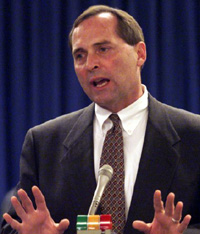Bottom line, not kids' welfare,
drives foster system
drives foster system
Nonprofit agencies make profit from public money
 By Debra Jasper and Elliot Jaspin Dayton Daily News
By Debra Jasper and Elliot Jaspin Dayton Daily News
Published: Wednesday, September 29, 1999
Sidebar to Part 4
COLUMBUS - Public money is supposed to go toward a public purpose, but
that's not always how the foster-care system works.
Some private agencies approach foster care as a business and turn what they
call a "profit" from money received to serve foster children.
`It's no different really than being a for-profit corporation,' Mansfield said. `Every state is different. It's bizarre. You want to see a nightmare, you ought to see Alabama.'
In that state, SAFY doesn't "make a profit' until it places 46.5 children, he said. But the state limits each foster-care office to a maximum of 48 children.
`If I had to vote on it today, I'd stay out of Alabama,' Mansfield said.
SAFY operates in seven states and has taken steps to move into three others. By 1997, it had built $4.5 million in assets and about $538,000 in cash because, just like any other company, it needs a needs cushion for bad times, Mansfield said.
That same year, SAFY generated revenues of $21.2 million. Virtually all of its money comes from government payments.
County officials in Ohio who contract with private agencies understand money drives decisions.
 Ohio Auditor Jim Petro |
Hess said the county's contract with SAFY stipulates that tax money paid to the agency must go to foster parents or administrative expenses. In May, Montgomery County paid SAFY about $4,700 a day to care for an estimated 90 kids. If SAFY has money left over, Hess said, the county has no say over it.
But Ohio Auditor Jim Petro and other state officials say the system has some serious accountability problems if agencies can spend money as they see fit.
`We can't get into a bidding system where we are saying, `We'll throw a bunch of money at you, and throw a bunch of kids at you, and if you can make some bucks on it, it's OK,' " Petro said. `It will end up being a boondoggle where everyone will drive a Mercedes at public expense.'
The debate over private agency spending was spurred by a Dayton Daily News series last year detailing serious flaws in Ohio's foster-care system. The series prompted Petro to investigate private foster agencies.
While final results are still out, Petro said he's become convinced major changes are needed. `We've identified weaknesses in the system that allow public funds intended to be used for children to be used for profit.'
Petro said many private agency officials believe if governments pay them $35 a day to take care of a child but they spend just $10, they should be able to "put $25 in their pocket and we should have no say in it."
`We don't look at it that way,' Petro said.
He said most private foster agencies operate with 100 percent public money and should be held accountable for how they spend it.
Ohio Rep. Jeff Jacobson, R-Phillipsburg, agrees. He and Petro are working together on legislation to overhaul the system.
`There is a lot of game-playing that goes on with agencies who claim public money is not public money once it's paid to them. But there won't be any room for argument once we get finished with this bill,' Jacobson said.
Among other changes, Jacobson will push for laws that limit how much private agencies can spend on administration and that require money earmarked for Ohio children be spent on Ohio children. SAFY, for instance, has used its resources - built in part on Ohio foster-care payments - to expand into other states.
`These people do not know what it means to be a nonprofit," Jacobson said. "Nonprofit means you are a charity. Charities are not designed to enrich you.'
Main Story:
Incentives for reform are few and feeble
Flow of government cash overwhelms the urge to overhaul
By Debra Jasper and Elliot Jaspin - DAYTON DAILY NEWS
Published: Wednesday, September 29, 1999, Page 1A